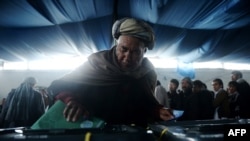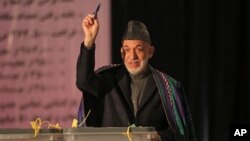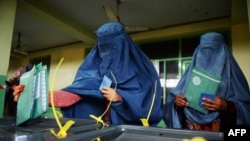KABUL —
Relief followed Afghanistan's historic presidential election Saturday, which was marked by high voter turnout and attacks by Taliban militants that were fewer than feared.
Election officials are calling the landmark poll, which marks the beginning of country's first democratic transfer of power, a success.
Following a recent spate of attacks by Taliban militants who have long vowed to disrupt Saturday's vote, security was tight across the nation, but the moment everyone was dreading never happened.
Despite some confirmed reports of violence, the Taliban failed to derail the election as millions of Afghans joined the process of choosing a new leader, creating a voter turnout that was so robust some polling stations ran out of ballots.
Walking out of the polling stations under gray skies, voters — men and women, young and old — proudly showed their purple-ink-stained fingers, proof they had voted.
The head of Afghanistan’s Independent Election Commission (IEC), Ahmad Yusuf Nuristani, appeared pleased with the result.
Story continues below photo gallery:
"Maybe more than seven million people voted," he said. "However, this is a preliminary, rough estimate, so the exact turnout can only be known once all the ballots are counted."
Preliminary results are expected by April 24, and a final tally of the votes is only to be announced May 14. But analysts are already predicting a second-round runoff.
U.S. President Barack Obama issued a statement congratulating the "millions" of Afghans who voted in what he called the "historic" elections. He also paid tribute to Americans who have "sacrificed so much" to make the vote possible.
Obama also called the election critical to securing Afghanistan’s democratic future as well as continued international support.
The United Nations says this year's newly registered voters included 1.3 million women.
In Kabul
Dressed in traditional blue burqas or more Western suits, hundreds of Afghans from all backgrounds filed past heavy security and were searched by military personnel before crowding into polling stations to cast their ballots.
Once in, women and men entered different rooms to fill out large paper ballots, hopeful their votes will help bring peace and jobs to Afghanistan after years of war.
Haji Bibi, a 94-year-old woman almost bent double with age, was helped to a chair outside after having cast her ballot.
She said she is waiting for better things to come in life, and wishing for a peaceful life for the country, and that young and old people alike should vote for peace and security.
Sohila Sahar arrived at the polling station to vote covered in a pale purple scarf and holding her young daughter's hand. She said she is proud of her nation.
"I am very happy when I see all this around me, that all these people came out and want to elect their next leader through the ballot box," she said. "I am really happy. My message is that all women in all the villages should go and vote and elect their leaders. This is their God-given right."
Reports of violence
After Afghanistan's roughly 6,200 polling stations finally closed late in the day, the relief in Kabul was almost palpable, and the heavy security presence on the streets began to ease.
In the days and weeks preceding election day, the Taliban's plan to derail the vote had been defined by violent attacks — attacks whose casualties included election officials, police, candidates, journalists and other civilians.
Interior Minister Omar Daudzai said although Saturday's vote went relatively smoothly, it did come at a price: at least 16 security personnel were killed in clashes in the hours leading up to the vote, and the death toll among militants was even higher.
"In the past 24 hours, there were a total of 140 attacks or preparations for attacks," the minister said. "It’s difficult to give details, but the important point here is that for each Afghan national security-force member who died, four times more militants were killed."
Daudzai said nine police, seven soldiers and four civilians were killed by militant attacks, and 43 were wounded. He reported 89 insurgents were killed.
The Taliban claims to have carried out 246 attacks during the polling.
Neighboring Pakistan closed all border crossings with Afghanistan and deployed additional troops in an attempt to help Afghanistan conduct the election peacefully.
Pakistan said border security arrangements were stepped up in close coordination with Afghan security forces. Pakistan's government also said it will free 13 more Taliban prisoners in a bid to bolster talks aimed at ending an insurgency that has killed thousands of people in recent years.
Voter, observer turnout Voters had a list of eight presidential candidates to choose from, of which three are front-runners: Ashraf Ghani, a former World Bank official; Zalmai Rassoul, a former minister; and Abdullah Abdullah, also a former minister.
Some 450 provincial government seats also were at stake.
Turnout was reportedly good throughout most of the country, and was particularly heavy in the former Taliban stronghold of Kandahar, according to local media.
Candidate Ghani, one of the three front-runners, had held huge political rallies in the southern province, the site of years of heavy fighting against the Taliban. Rassoul, however, has had a strong base in the south, and Abdullah Abdullah has drawn support from different areas of the country. President Hamid Karzai was prohibited from running for re-election.
Observers nominated by the candidates, government election officials and local independent monitors were standing watch inside the polling stations to guard against attempts to manipulate the vote, such as the widespread fraud that marred the country's last elections, in 2009.
According to the interior ministry, six people were arrested Saturday when they were caught cheating at the polls. Five others were detained in eastern Khost province when they were found carrying 1,000 fake IDs.
Ihmaduddin, an observer in a Kabul polling station, was determined to prevent any ballot rigging.
"It’s my job to control and supervise the voting process to prevent fraud," he said, explaining that he and others are also here to observe the ballot counting.
Twenty-one-year-old voter Idriss called the elections important for all Afghans.
“It is 10 years we are facing with bad problems in Afghanistan, in all sides of Kabul and other cities in Afghanistan, but we are, everybody, is trying to vote for a president who would be great for Afghanistan and make a future that is better for them,” he said.
Saturday's election is seen as pivotal for Afghanistan’s political and economic future, as well as a test of wills between the Afghan people and the Taliban.
Some information for this report provided by Reuters.
Election officials are calling the landmark poll, which marks the beginning of country's first democratic transfer of power, a success.
Following a recent spate of attacks by Taliban militants who have long vowed to disrupt Saturday's vote, security was tight across the nation, but the moment everyone was dreading never happened.
Despite some confirmed reports of violence, the Taliban failed to derail the election as millions of Afghans joined the process of choosing a new leader, creating a voter turnout that was so robust some polling stations ran out of ballots.
Walking out of the polling stations under gray skies, voters — men and women, young and old — proudly showed their purple-ink-stained fingers, proof they had voted.
The head of Afghanistan’s Independent Election Commission (IEC), Ahmad Yusuf Nuristani, appeared pleased with the result.
Story continues below photo gallery:
"Maybe more than seven million people voted," he said. "However, this is a preliminary, rough estimate, so the exact turnout can only be known once all the ballots are counted."
Preliminary results are expected by April 24, and a final tally of the votes is only to be announced May 14. But analysts are already predicting a second-round runoff.
U.S. President Barack Obama issued a statement congratulating the "millions" of Afghans who voted in what he called the "historic" elections. He also paid tribute to Americans who have "sacrificed so much" to make the vote possible.
Obama also called the election critical to securing Afghanistan’s democratic future as well as continued international support.
The United Nations says this year's newly registered voters included 1.3 million women.
In Kabul
Dressed in traditional blue burqas or more Western suits, hundreds of Afghans from all backgrounds filed past heavy security and were searched by military personnel before crowding into polling stations to cast their ballots.
Once in, women and men entered different rooms to fill out large paper ballots, hopeful their votes will help bring peace and jobs to Afghanistan after years of war.
Haji Bibi, a 94-year-old woman almost bent double with age, was helped to a chair outside after having cast her ballot.
She said she is waiting for better things to come in life, and wishing for a peaceful life for the country, and that young and old people alike should vote for peace and security.
Sohila Sahar arrived at the polling station to vote covered in a pale purple scarf and holding her young daughter's hand. She said she is proud of her nation.
"I am very happy when I see all this around me, that all these people came out and want to elect their next leader through the ballot box," she said. "I am really happy. My message is that all women in all the villages should go and vote and elect their leaders. This is their God-given right."
Reports of violence
After Afghanistan's roughly 6,200 polling stations finally closed late in the day, the relief in Kabul was almost palpable, and the heavy security presence on the streets began to ease.
In the days and weeks preceding election day, the Taliban's plan to derail the vote had been defined by violent attacks — attacks whose casualties included election officials, police, candidates, journalists and other civilians.
Interior Minister Omar Daudzai said although Saturday's vote went relatively smoothly, it did come at a price: at least 16 security personnel were killed in clashes in the hours leading up to the vote, and the death toll among militants was even higher.
"In the past 24 hours, there were a total of 140 attacks or preparations for attacks," the minister said. "It’s difficult to give details, but the important point here is that for each Afghan national security-force member who died, four times more militants were killed."
Daudzai said nine police, seven soldiers and four civilians were killed by militant attacks, and 43 were wounded. He reported 89 insurgents were killed.
The Taliban claims to have carried out 246 attacks during the polling.
Neighboring Pakistan closed all border crossings with Afghanistan and deployed additional troops in an attempt to help Afghanistan conduct the election peacefully.
Pakistan said border security arrangements were stepped up in close coordination with Afghan security forces. Pakistan's government also said it will free 13 more Taliban prisoners in a bid to bolster talks aimed at ending an insurgency that has killed thousands of people in recent years.
Voter, observer turnout Voters had a list of eight presidential candidates to choose from, of which three are front-runners: Ashraf Ghani, a former World Bank official; Zalmai Rassoul, a former minister; and Abdullah Abdullah, also a former minister.
Some 450 provincial government seats also were at stake.
Turnout was reportedly good throughout most of the country, and was particularly heavy in the former Taliban stronghold of Kandahar, according to local media.
Candidate Ghani, one of the three front-runners, had held huge political rallies in the southern province, the site of years of heavy fighting against the Taliban. Rassoul, however, has had a strong base in the south, and Abdullah Abdullah has drawn support from different areas of the country. President Hamid Karzai was prohibited from running for re-election.
Observers nominated by the candidates, government election officials and local independent monitors were standing watch inside the polling stations to guard against attempts to manipulate the vote, such as the widespread fraud that marred the country's last elections, in 2009.
According to the interior ministry, six people were arrested Saturday when they were caught cheating at the polls. Five others were detained in eastern Khost province when they were found carrying 1,000 fake IDs.
Ihmaduddin, an observer in a Kabul polling station, was determined to prevent any ballot rigging.
"It’s my job to control and supervise the voting process to prevent fraud," he said, explaining that he and others are also here to observe the ballot counting.
Twenty-one-year-old voter Idriss called the elections important for all Afghans.
“It is 10 years we are facing with bad problems in Afghanistan, in all sides of Kabul and other cities in Afghanistan, but we are, everybody, is trying to vote for a president who would be great for Afghanistan and make a future that is better for them,” he said.
Saturday's election is seen as pivotal for Afghanistan’s political and economic future, as well as a test of wills between the Afghan people and the Taliban.
Some information for this report provided by Reuters.







